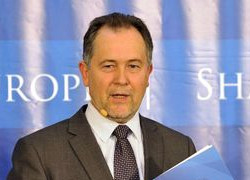Pavol Demeš: Visa restrictions must be lifted for Belarusians and sanctions on the regime must be strengthened
- 16.04.2013, 12:59

A softer stance on the dictatorship will be Lukashenka's unconditional victory over the EU.
Pavol Demeš, a former Slovak foreign minister and expert from the German Marshal Fund said it in an interview with Radio Svaboda.
“I didn't notice any changes in the human rights situation in Belarus. I don't understand why the EU has suddenly softened its position. The EU expects official Minsk to release and rehabilitate political prisoners. These are the main steps to be made by official Minsk. The EU should not make steps forward, for example, lift a visa ban from the Belarusian foreign minister, unless it happens. It would be a mistake.
Lukashenka, who has been in power for almost 19 years, skilfully balances between the West and Russia. He always feels perfectly what he should do. The EU is experiencing a political and financial crisis. The inner crisis of the EU affects the strategic approach to Belarus. Lukashenka says the political prisoners are not important and a pragmatic dialogue is needed. If the EU agrees, it will be Lukashenka's victory. He will show he is master in his house and will dictate his policy to the EU,” the Slovak politician said.
Slovakia's former foreign minister thinks that Belarus is “in already known geopolitical conditions”. He doesn't understand what has changed:
“Belarus has the West and the EU on one side and the East and the Eurasian Union on the other side. And Russia's pressure on Belarus. This is reality. What has changed? Why has the European Union changed its approach to Belarus? Why is this principled stance we saw from the EU after the brutality of December 2010 changing? The situation in the EU has changed, but there have been no changes in Belarus. We see asymmetry in relations. Europe is in crisis. Lukashenka strengthened its power and total control in Belarus having eliminated civil society and political opposition.
The EU has a partner that is not more open to the EU conditions than it was earlier. In these conditions the EU is ready to establish a dialogue for economic pragmatics. I cannot understand this logic. Firstly, if Europe has a dialogue with Belarus before the political prisoners are released, it will be a sign of weakness. Secondly, if someone calls the EU policy toward Belarus a 'dialogue on modernisation', how can they conduct a dialogue if Lukashenka made no concessions? If it happens, it again will be Lukashenka's victory over the EU.”
Pavol Demeš is confident that Lukashenka understands only force:
“He is a player who uses force in his own country and uses force in international relations. If you show your weakness, he will use it. Lukashenka is an intuitive politician. He knows well how the EU works and how difficult it is for 27 EU members states to reach an agreement. In my opinion, the EU should add two main directions in its policy. Firstly, visa restrictions must be lifted for Belarusians, so that they could travel to the EU. Secondly, sanctions must be not weakened, but strengthened to demonstrate that the EU has tools to make the existence of the regime even less comfortable.
Political prisoners is a minimum test. It's not the end. When the political prisoners are rehabilitated, liberalisation of political and civil spheres must continue. If Lukashenka releases political prisoners, it will not mean Nirvana was reached.
Lukashenka saw many EU commissioners. If the EU commissioners thinks they can do a little here and a bit there to have their names be associated with small successes, it's not a good idea. Lukashenka has great experience of using weakness of the European policy toward Belarus. The EU should think how to show its force in relations with Lukashenka and his regime and how to show people, who influence the political dynamics in the country, that we regard Belarus not only as a theoretical problem, but also as a neighbouring country with 10 million people, for whom we want to do something.”
According to the politician, the situation in Belarus today resembles the situation in Hungary, Czechoslovakia and Poland before 1989.
“We had dictatorships in those times and had no political and civil liberties. Belarus is a dictatorship, so there are no real conditions for political opposition that would influence the country's people and international relations. This is a group of dissidents who want to do something for their country. They think balancing or collaboration with the regime can help to preserve the country's independence, because people fear Russia may annex Belarus. Other dissidents suppose that other things are important. I think Lukashenka exploits these two groups of dissidents to gain his goals. In certain periods, the European Union works with those people from the dissident groups, who support approaches of Brussels.
None of opposition groups, political parties or NGOs in Belarus have real possibilities to affect both domestic and foreign policy. Lukashenka keeps the situation in the country under his full control. We need to take it into account instead of using various opposition groups. All Belarusians I know are concerned about future of their country. It is ridiculous of the EU to say: 'You are the opposition, be united, create a coalition, agree on a single leader who will be proposed as a presidential candidate.' It is an illusion. It is impossible in the conditions created by Lukashenka,” Demeš is confident.










